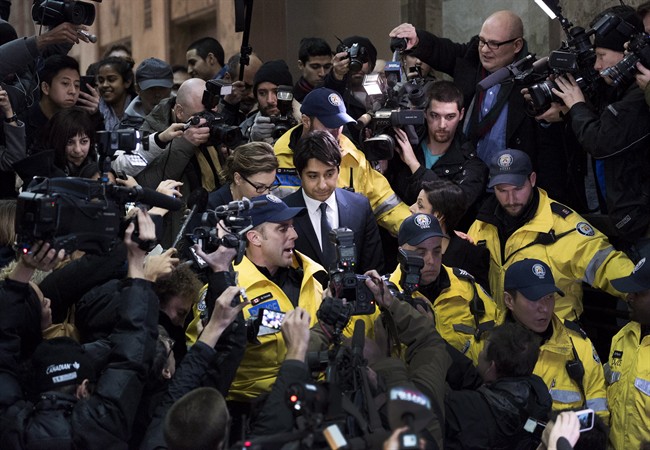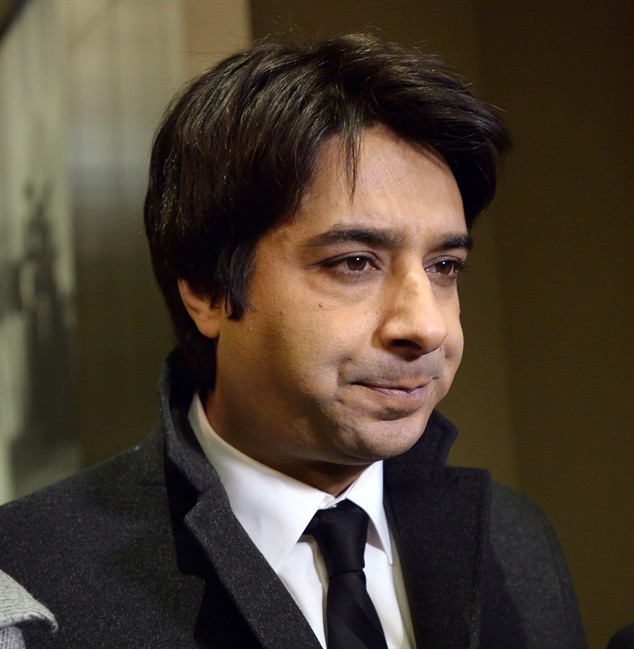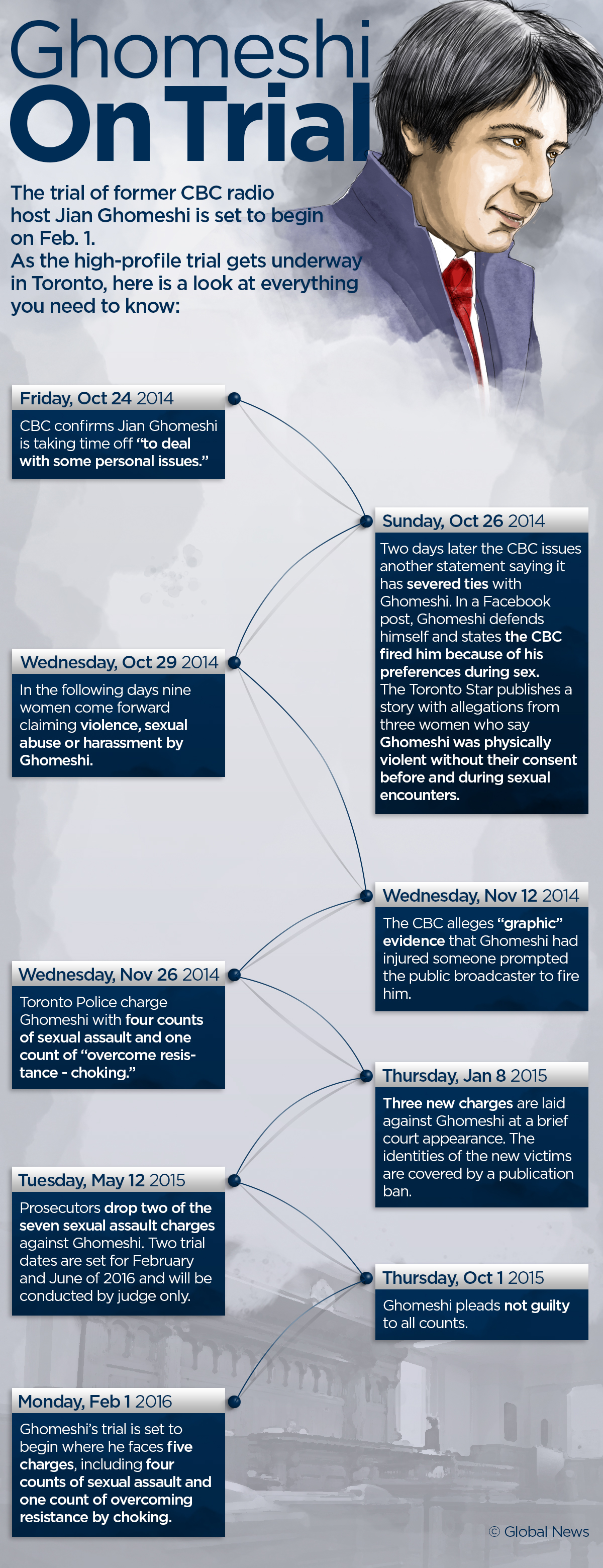On the first day of former CBC radio star Jian Ghomeshi’s trial, a witness described a “rage” within him that manifested itself during alleged physical attacks that left her feeling “stunned and worried” and like she had been thrown out “like trash,” while his defence team aimed to methodically poke holes in her testimony.

Ghomeshi, who rose steeply to fame with the national broadcaster hosting flagship program Q after gaining notoriety as a musician with folk-rock group Moxy Früvous in the 90s, stands accused of four counts of sexual assault and one count of overcoming resistance by choking. He has pleaded not guilty.
The first witness to appear at trial, whose identity is protected under publication ban, told the court details of an alleged encounter in December 2002 that began with a “flirtatious” meeting between the two.
She told the court she was invited to an episode of CBC Newsworld’s TV show >play, which Ghomeshi had hosted at the time.
READ MORE: Key players in the Jian Ghomeshi trial are no stranger to legal spotlight
Shortly after that meeting, the complainant described her perception of Ghomeshi as a “perfect gentleman” who drove a bright yellow Volkswagen Beetle that reminded her of a Disney movie, adding that he made her feel “safe.”
She then said Ghomeshi became “playful” and “flirtatious” and asked her to undo buttons on her blouse in his car, which she said she declined.
That’s when the alleged victim said Ghomeshi kissed her, put his hand around her head and pulled her hair “hard” for several seconds.
“I wasn’t sure what had just happened,” she told the court, adding that there had been no prior discussion about hair-pulling.
“He had been so nice.”
The witness described the alleged hair-pulling incident as “painful and sudden” and thought that perhaps Ghomeshi didn’t “know his own strength.”
She went on to detail another encounter weeks later, when she said she attended Ghomeshi’s home after another taping of >play in Toronto.
She said the two left the taping, went to a pub and then began kissing on Ghomeshi’s couch shortly after arriving at his home.
READ MORE: Jian Ghomeshi trial: What you need to know as the trial begins
That’s when the alleged victim said Ghomeshi ended up behind her, and grabbed her hair again “really hard.”
Ghomeshi then began “punching” the alleged victim in the head multiple times with what felt like a “closed fist,” the witness said, adding that her ears were ringing and she felt as though she was going to faint.
“I felt like I had walked into a pole or hit my head on the pavement,” she told the court. “It was that strong and I thought I was going to pass out.”
The alleged victim said Ghomeshi “didn’t apologize” for his actions when she began crying and told her, “You should go now, I’ll call you a cab.”
“He threw me out like trash,” the witness told the court, adding that there was a “rage” inside Ghomeshi during the alleged inicident that left her “stunned and worried.”
The witness told the court she decided to speak to the police about the alleged incident more than a decade later, on Oct. 30, 2014, when other allegations against Ghomeshi had arisen in the media and then-Toronto police chief Bill Blair held a press conference urging sexual assault victims to come forward.
She added that before speaking to police, she spoke to the Toronto Star in a highly publicized story that extensively detailed her allegations against Ghomeshi, adding that she did not think reporter Kevin Donovan “portrayed what I said accurately.”
She later testified that Donovan “changed” her story, twisted her words and added that from what she’d seen and heard about Donovan, he “gets a lot of that wrong.”
The alleged victim told the court she went to the Toronto Star and other media outlets before she knew she could go to police, adding that she “thought it was too late.”
“It was just easier, I thought, to carry on and try to put it behind me as a bad experience,” the alleged victim told the court, adding that no one had encouraged her to speak out or what specifically to say with regard to the allegations.
Ghomeshi’s defence lawyer Marie Henein began her cross-examination of the complainant by analyzing her statement to police on Nov. 1, 2014, in which the witness said she had been truthful.
From that initial interview with police, Henein said two allegations of sexual assault arose against Ghomeshi. Henein added that police did not ask the complainant to turn over emails or take her to the location where the alleged incidents had occurred.
Henein said that was the only interview police had conducted with the alleged victim, and that police warned her before she gave her statement that she should stop reading and watching media reports regarding the allegations against Ghomeshi.
WATCH: Lawyer: No Ghomeshi jury opens up ‘certain avenues’

She noted that in total, the complainant gave three media interviews before going to police and at least one after the fact, and had used Google to determine how to contact the media initially.

Get daily National news
The complainant told the court that she had mentioned to police that Ghomeshi was “smitten” with her and that she did want to see him again but the allegedly violent incident had made her “unsure” of him.
Henein then asked if the accuser was the one was in fact “smitten” with Ghomeshi because he was a “famous person,” as allegedly reported by a friend. She responded that was not the case.
Ghomeshi’s lawyer then attempted to systematically unravel the alleged victim’s account of events, highlighting repeated perceived inconsistencies in an attempt to cast reasonable doubt on her testimony.
The witness denied allegations that she was “disappointed” after attending a second airing of >play in Toronto, because Ghomeshi allegedly wasn’t interested in her.

“Is your recollection that you expected a romantic evening that night?” Henein asked of the second meeting between the two, to which the alleged victim replied that she hadn’t.
Henein then alleged that the complainant had told police she had gone straight to Ghomeshi’s house that night, and not to a pub with him initially as she had testified.
“I was trying to get the story out,” the alleged victim said during cross-examination, adding that she was “nervous” at the time while giving her statement to police.
Then Henein pointed out another alleged discrepancy, adding that Ghomeshi did not own the yellow Volkswagen Beetle until months after the complainant had testified he had.
“I have a recollection of a bright yellow car that looked like a Beetle,” the witness said.
READ MORE: Securing convictions in cases of sexual assault notoriously difficult: experts
Henein continued her methodical assault on the witness’ allegations and raised questions that she had told police she might have had hair extensions at the time her hair was reportedly pulled “hard” by Ghomeshi.
The witness said she ultimately concluded she hadn’t and would have retracted her comments about the hair extensions to police, but had thought she was talking to investigators in confidence at the time through email – but found out soon after that she wasn’t and the statement would be used in court.
Henein asked why the alleged victim hadn’t corrected that with police, and the witness said she had intended to clear it up in court.
Henein added that despite that, the witness did not clear up the details regarding hair extensions in her testimony to the Crown either, to which the alleged victim responded that the process was “new” to her and that she may have gotten things wrong.
The defence lawyer’s focus then shifted to inconsistencies in the alleged victim’s statements to police and the allegations she reported in the media.
The witness said Ghomeshi did not grab her hair as soon as she entered his vehicle, as reported in The Toronto Star, but Henein cast further doubt by bringing up another interview the woman had done with CBC’s The National that Henein said was in “her own words.”
In that interview, the complainant confirmed that the alleged incident had occurred when she and Ghomeshi were not intimate, in contrast to her testimony where she said he had kissed her sensually.
“Do you agree that you lied?” Henein asked the witness, who responded that she “did not lie.”
“I was getting the main points out, of my experience of being abused,” the alleged victim said.
She added that she “had a memory of the kissing” but wasn’t sure of her recollections at the time of the interview with The National because she was “high on nerves” and needed to “sit with it” for some time to have a more accurate account.
Henein used those statements in the media to form the basis of her underlying argument – namely that the allegations made in the media, to the Crown and to police did not match up.
Another aspect of the complainant’s testimony highlighted by Henein was in regard to alleged discrepancies in her statement to police about the direction her hair was pulled by Ghomeshi.
Henein asked why the alleged victim didn’t later tell police she had “got it wrong” when describing that Ghomeshi had allegedly smashed her head against a window in the vehicle, with the witness responding in court that her head had merely “came in contact with the window.”
WATCH: Preview of the Jian Ghomeshi trial

The complainant then said she didn’t know her emails to police would be used against her in the trial, which is where the line of questioning ended after technical difficulties caused a delay in the airing of the witness’ November 2014 video testimony to police, which is likely to be the main focus of Tuesday’s cross-examination.
After the alleged victim testified she did not know she could have called police, Henein alluded to the fact that the complainant had called police at that time in regard to other topics, which could insinuate that she knew contacting police was a possibility. Those specific details have not yet been presented in court.
Forty-eight-year-old Ghomeshi, who was born in London, England but raised in Thornhill, Ont., will face a second trial in June on a separate charge of sexual assault, which arose from an alleged incident in January 2008 while he was the host of CBC Radio One’s popular current affairs program Q.
None of the allegations against Ghomeshi have been proven in court.
Questions around Ghomeshi’s future with the CBC arose on Oct. 24, 2014, just weeks after the death of his father, when the then-radio star first announced he was taking time off “to deal with some personal issues.”
Two days later, the public broadcaster announced it had severed ties with the popular host, who was also broadcast on over 180 NPR/PRI stations and syndicated in the U.S.
That night, Ghomeshi took to Facebook to inform his fans that he had “been fired from the CBC because of the risk of my private sex life being made public,” adding that he planned to defend himself against a forthcoming “campaign of false allegations pursued by a jilted ex girlfriend and a freelance writer.”
In a post that will likely play a huge role in his trial, Ghomeshi wrote that he had participated in “rough sex” and “adventurous forms of sex that included role-play, dominance and submission,” but only engaged in “sexual practices that are mutually agreed upon, consensual, and exciting for both partners.”
On Oct. 27, 2014, Ghomeshi filed a $55 million lawsuit against the CBC, alleging breach of confidence, bad faith and defamation by the public broadcaster. That lawsuit was then dropped less than a month later.
Lucy DeCoutere, an actress on The Trailer Park Boys, then publicly accused Ghomeshi of choking her “to the point she could not breathe” and slapping her “hard three times on the side of her head” in a Toronto Star story written by investigative reporter Kevin Donovan and CANADALAND founder Jesse Brown on Oct. 29, 2014.

In another Facebook post, Ghomeshi thanked his supporters and promised to confront the allegations against him “directly,” but added he would not discuss the matter with the media.
Then on Oct. 31, 2014, Toronto police confirmed they were investigating Ghomeshi after two women had come forward with complaints.
The executive vice-president of the CBC, Heather Conway, wrote in a memo to staff that same day that the “CBC saw for the first time graphic evidence that Jian had caused physical injury to a woman” and “determined that Jian’s conduct was a fundamental breach of CBC’s standard of acceptable conduct for any employee.”
The Toronto Star then quoted unnamed sources that alleged Ghomeshi had shown his bosses videos that depicted bondage and beating during sexual activities, in an effort to show bruising could occur and still be consensual.
Ghomeshi was charged with four counts of sexual assault and one count of overcoming resistance by choking on Nov. 26, 2014 – a month to the day after he was fired from the CBC – and he was released on $100,000 bail and ordered to live with his mother.
READ MORE: What is ‘overcome resistance – choking?’
A month later, three new charges of sexual assault were laid against Ghomeshi, with all of the offences alleged to have occurred between 2002 and 2008.
The Crown later dropped two of the sexual assault charges in May 2015, citing no reasonable prospect of conviction.
Now, more than a year after allegations first arose against the embattled former broadcaster, Ghomeshi will face his accusers in court.
While the outcome of the trial and Ghomeshi’s future have yet to be determined, the allegations have already sparked change within the CBC.
The conclusions from an investigative report into the national broadcaster’s handling of the Ghomeshi scandal were deemed “troubling and disappointing” by the CBC in April 2015.
The report detailed allegations that Ghomeshi was “deeply disrespectful to employees” and sexually harassed some colleagues, prompting an apology by upper management to those “who experienced inappropriate behaviour,” adding that it “has no place at CBC/Radio-Canada.”
READ MORE: Jian Ghomeshi says he’ll ‘meet allegations directly’
Outside investigator Janice Rubin interviewed 99 people over five months and detailed nine recommendations for the CBC and a litany of alleged transgressions by Ghomeshi that initially went unpunished.
A majority of witnesses described a “pattern of behaviour and conduct” that fell below the CBC’s standards and was “deeply disrespectful to employees,” including yelling, belittling and humiliating others, playing pranks and cruel jokes, and in a “small number of cases,” sexually harassing colleagues.
Ghomeshi was also accused of giving “creepy and disrespectful” back and shoulder massages and allegedly made colleagues uncomfortable by speaking about his sex life in the workplace, according to the report.
The report also contains allegations that managers who worked with Ghomeshi failed to investigate his behaviour or take steps to stop it, which prompted the CBC to announce it was “severing ties” with two top executives.
Chris Boyce, executive director of CBC Radio, and Todd Spencer, the head of human resources and industrial relations for English services, both left the public broadcaster just before the release of the report.
The trial is expected to last several weeks, after which Ghomeshi will face a second sexual assault trial in June.















Comments